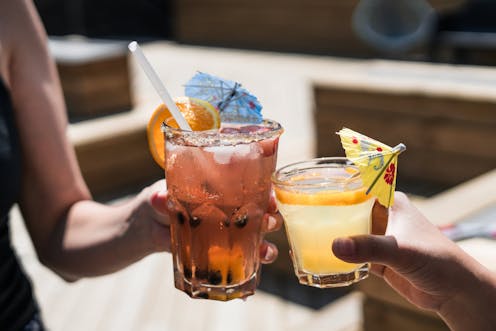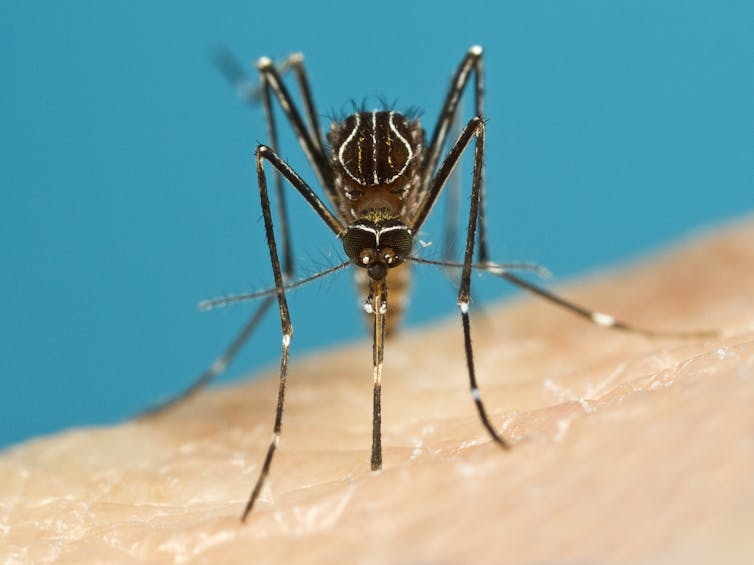What can I eat to stop mosquitoes biting me?
 Could the menu for your upcoming backyard party help keep the pesky mosquitoes away? From Pexels, CC BY-NC-ND
Could the menu for your upcoming backyard party help keep the pesky mosquitoes away? From Pexels, CC BY-NC-NDThe warm weather is beckoning us into the backyard but pesky bloodsuckers are waiting. Insect repellents are safe and effective but many people are reluctant to rub what they perceive to be smelly or sticky on their skin. Wouldn’t it be great if there was something you could eat or drink to protect yourself from mosquito bites?
There are plenty of “mozzie busting” gadgets and gimmicks marketed as alternatives to topical formulations. From wrist bands to smartphone apps, the range of products reflects the demand among the public for these products. Unfortunately, few of these provide effective protection.
We know some people are more likely to be bitten by mosquitoes than others, with the bacteria on our skin playing a crucial role in our attractiveness to mosquitoes. Studies indicate our parents are mostly to blame, not our diets.
Read more - Health Check: why mosquitoes seem to bite some people more
Many myths surround the food and drink that may keep mosquitoes at bay but, when it comes to the science behind these theories, it all becomes a bit too hard to swallow.
Cheers to mosquito-borne disease
Love a gin and tonic? There was once a time you could sip your way out of a malaria-induced fever. It was more about the tonic than the gin. A key ingredient in tonic water is quinine. Derived from the bark of a cinchona tree, quinine had been identified as a treatment for malaria in the 1960s and although it’s currently not recommended as a first-line treatment, historically it was critically important in battling the parasites that cause malaria.
It’s important to note that while it’s thought to be toxic to the parasites, there was no evidence it actually stopped mosquito bites. Also, modern tonic water hardly contains any quinine.
Booze and mosquito bites may actually make a good match. Studies in Africa have demonstrated drinking beer can make you more attractive to mosquitoes. After downing a few glasses of beer, volunteers were found to attract more mosquitoes than those drinking just water.
Why? It didn’t seem to be due to body temperature or the amount of carbon dioxide exhaled. Perhaps mosquitoes are evolving to bite drunk people less able to swat the bloodsuckers away?
 The ‘Aussie Backyard Mozzie’, Aedes notoscriptus, taking a bloodmeal.
Stephen Doggett (NSW Health Pathology)
The ‘Aussie Backyard Mozzie’, Aedes notoscriptus, taking a bloodmeal.
Stephen Doggett (NSW Health Pathology)
Read more: The best (and worst) ways to beat mosquito bites
Snacking your way to a bite-free summer?
One of the most commonly suggested foods to eat to avoid mosquito bites is the humble banana. Problem is, it seems as many people think eating bananas will make you more attractive to mosquitoes than not! There isn’t the science to support either claim, but it’s unlikely eating bananas would substantially change the way mosquitoes pick you out from a crowd.
If garlic can keep mythic blood suckers away, what about those buzzing about in real life? Nope. Our breath may smell a bit after a garlic-rich meal but a study has shown it does nothing to lessen our attractiveness to mosquitoes. It may actually make us more attractive to vampires, according to science!
Beating bloodsuckers with vitamin B?
Perhaps one of the most pervasive home remedies perceived to prevent mosquito bites is taking vitamin B. Anecdotal reports, and many personal testimonies, of the effectiveness of this approach abound, but there a few scientific investigations testing the claim.
Studies dating back to the 1940s failed to provide proof of protection from mosquito bites after taking vitamin B. More recently, a 2005 study showed there was no evidence it influenced the attraction of mosquitoes to human skin-derived chemicals from volunteers taking vitamin B supplements. There is simply no evidence taking vitamin B will offer any significant protection from mosquito bites.
In reality, if there was even moderate scientific evidence that taking a vitamin supplement could prevent mosquito bites, our supermarket shelves would be full of “mosquito repellent pills”. It would be wonderful to be able to pop a pill a day to stop mosquito bites but we’re unlikely to have that luxury any time soon.
Read more - Chemical or natural: what’s the best way to repel mozzies?
In fact, products marketed as oral insect repellents are not recognised by some government agencies given the lack of any compelling evidence to support the claims.
Don’t use mosquito bite prevention as an excuse to boost your intake of vegemite either. It may be a staple in most Australian households, but it won’t make our summer backyard activities any less bite-prone, no matter how much vitamin B it contains (or how much you spread on your toast).
The reality is, if there was great science supporting any of these mosquito bite-blocking claims associated with food and drink, countless companies would be cashing in on selling “mosquito repellent vitamins” and I have little doubt topical insect repellents would disappear from our supermarket shelves. I don’t see that happening anytime soon.
Cameron Webb and the Department of Medical Entomology, NSW Health Pathology, have been engaged by a wide range of insecticide manufacturers to provide testing of products and provide expert advice on, specifically, mosquito biology. Cameron has also received funding from local, state, federal and international agencies to undertake research into mosquito-borne disease surveillance and management strategies.
Authors: Cameron Webb, Clinical Lecturer and Principal Hospital Scientist, University of Sydney...




